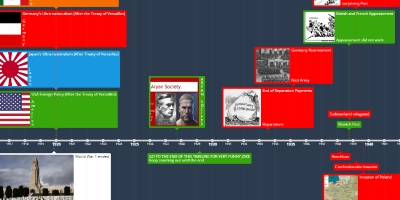1 янв 1920 г. - Italy's Ultra-nationalism (After Treaty of Versailles)
I
a
t
l
y
Описание:
In 1915 all the warred nations had promised territory to Italy in exchange for joining the Allied cause. However, when the war ended, the principle of national self determination stood in the way of Italian efforts to collect on this promise. Under this widely accepted idea, the Allies could not grant Italy the territory it had been promised because it was not theirs to give, since most of the territory promised to Italy was populated by non-Italians. The Italian Prime Minister Vittorio Orlando returned from the Paris Peace Conference at the close of World War I empty-handed, with nothing to show for the sacrifices of the Italian war effort. The Italian people naturally turned against Orlando's government, as well as the returning veterans, and both were widely despised. Adding to the misery of returning home from the war to widespread unemployment and poverty. Like the other nations, Italy had borrowed extensively to finance its war effort. In 1919, the Italian national debt was six times its pre-war level, and the lira had depreciated to one-third its pre-war value. To make matters worse, the democratically elected Chamber of Deputies, Italy's primary governing body, was unpaid, and thus prone to corruption and bribery. Amidst the chaos of the early inter-war years, Benito Mussolini founded the Fascist Party, the Fascio di Combattimento, in March 1919. The Fascist Party, composed largely of war veterans, was anti-communist, and advocated the glorification of war, which they claimed displayed the nobility of the Italian soul. The Fascists thought Italy was destined to recapture the glory of Rome.
Добавлено на ленту времени:

Interwar Period
Дата:
Изображения:
![]()
